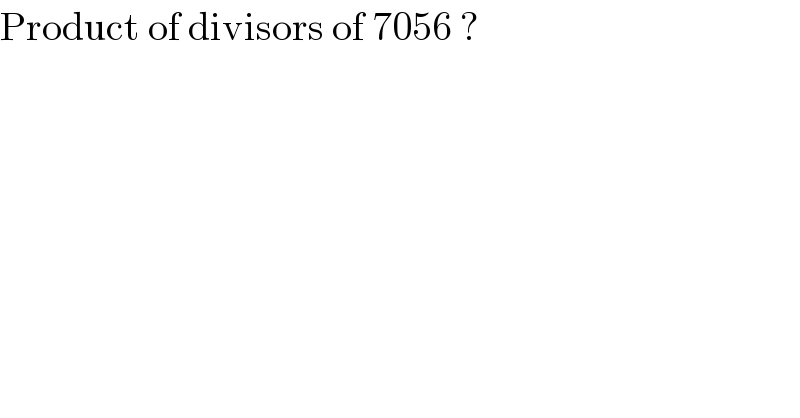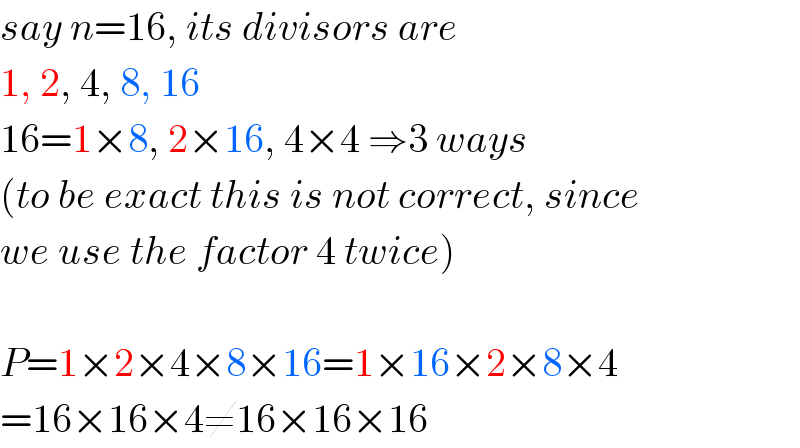
Question Number 112999 by Aina Samuel Temidayo last updated on 10/Sep/20

$$\mathrm{Product}\:\mathrm{of}\:\mathrm{divisors}\:\mathrm{of}\:\mathrm{7056}\:? \\ $$
Answered by mr W last updated on 10/Sep/20

$$\mathrm{7056}=\mathrm{2}^{\mathrm{4}} ×\mathrm{3}^{\mathrm{2}} ×\mathrm{7}^{\mathrm{2}} \\ $$$${divisor}\:\mathrm{2}^{\mathrm{0}..\mathrm{4}} ×\mathrm{3}^{\mathrm{0}..\mathrm{2}} ×\mathrm{7}^{\mathrm{0}..\mathrm{2}} \\ $$$${number}\:{of}\:{divisors}\:{d}=\mathrm{5}×\mathrm{3}×\mathrm{3}=\mathrm{45} \\ $$$${product}\:{of}\:{all}\:{divisors} \\ $$$${P}=\underset{\mathrm{0}\leqslant{i}\leqslant\mathrm{4},\mathrm{0}\leqslant{j},{k}\leqslant\mathrm{2}} {\prod}\mathrm{2}^{{i}} ×\mathrm{3}^{{j}} ×\mathrm{7}^{{k}} \\ $$$$=\mathrm{2}^{\left(\mathrm{0}+\mathrm{1}+\mathrm{2}+\mathrm{3}+\mathrm{4}\right)×\mathrm{3}×\mathrm{3}} ×\mathrm{3}^{\left(\mathrm{0}+\mathrm{1}+\mathrm{2}\right)×\mathrm{5}×\mathrm{3}} ×\mathrm{7}^{\left(\mathrm{0}+\mathrm{1}+\mathrm{2}\right)×\mathrm{5}×\mathrm{3}} \\ $$$$=\mathrm{2}^{\mathrm{90}} ×\mathrm{3}^{\mathrm{45}} ×\mathrm{7}^{\mathrm{45}} \\ $$$$=\left(\mathrm{2}^{\mathrm{4}} ×\mathrm{3}^{\mathrm{2}} ×\mathrm{7}^{\mathrm{2}} \right)^{\frac{\mathrm{45}}{\mathrm{2}}} \\ $$$$=\mathrm{7056}^{\frac{\mathrm{45}}{\mathrm{2}}} \\ $$$$=\mathrm{84}^{\mathrm{45}} \\ $$$${generally}\:{P}\left({n}\right)={n}^{\frac{{d}\left({n}\right)}{\mathrm{2}}} \\ $$$${n}=\:{any}\:{number} \\ $$$${d}\left({n}\right)={number}\:{of}\:{divisors}\:{of}\:{n} \\ $$$${P}\left({n}\right)={product}\:{of}\:{divisors}\:{of}\:{n} \\ $$
Commented by Aina Samuel Temidayo last updated on 10/Sep/20

$$\mathrm{The}\:\mathrm{no}.\:\mathrm{of}\:\mathrm{ways}\:\mathrm{7056}\:\mathrm{can}\:\mathrm{be}\:\mathrm{expressed} \\ $$$$\mathrm{as}\:\mathrm{the}\:\mathrm{product}\:\mathrm{of}\:\mathrm{two}\:\mathrm{factors}\:\mathrm{is}? \\ $$
Commented by mr W last updated on 10/Sep/20

$$\lceil\frac{{d}\left({n}\right)}{\mathrm{2}}\rceil=\lceil\frac{\mathrm{45}}{\mathrm{2}}\rceil=\mathrm{23}\:{ways} \\ $$
Commented by Aina Samuel Temidayo last updated on 10/Sep/20

$$\mathrm{So}\:\mathrm{why}\:\mathrm{is}\:\mathrm{P}\left(\mathrm{n}\right)\:\mathrm{not}\:\mathrm{7056}^{\mathrm{23}} =\mathrm{84}^{\mathrm{46}} ? \\ $$
Commented by mr W last updated on 11/Sep/20

$${say}\:{n}=\mathrm{16},\:{its}\:{divisors}\:{are} \\ $$$$\mathrm{1},\:\mathrm{2},\:\mathrm{4},\:\mathrm{8},\:\mathrm{16} \\ $$$$\mathrm{16}=\mathrm{1}×\mathrm{8},\:\mathrm{2}×\mathrm{16},\:\mathrm{4}×\mathrm{4}\:\Rightarrow\mathrm{3}\:{ways} \\ $$$$\left({to}\:{be}\:{exact}\:{this}\:{is}\:{not}\:{correct},\:{since}\right. \\ $$$$\left.{we}\:{use}\:{the}\:{factor}\:\mathrm{4}\:{twice}\right) \\ $$$$ \\ $$$${P}=\mathrm{1}×\mathrm{2}×\mathrm{4}×\mathrm{8}×\mathrm{16}=\mathrm{1}×\mathrm{16}×\mathrm{2}×\mathrm{8}×\mathrm{4} \\ $$$$=\mathrm{16}×\mathrm{16}×\mathrm{4}\neq\mathrm{16}×\mathrm{16}×\mathrm{16} \\ $$
Commented by Aina Samuel Temidayo last updated on 11/Sep/20

$$\mathrm{Ok}.\:\mathrm{Thanks}. \\ $$
